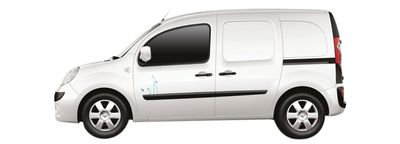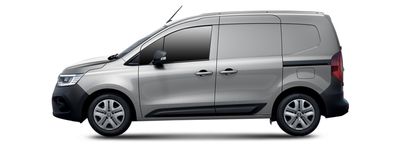Table of Contents
Renault Kangoo engines
Since its launch in 1997, Renault Kangoo has become one of the most successful high-roof estates, offering a diverse Renault Kangoo engine range over three generations. Each generation has brought new technologies and different strengths and weaknesses, with the evolution from simple naturally aspirated engines to modern turbocharged engines and electric powertrains demonstrating a remarkable technological evolution.

Renault Kangoo engines: Generation I (1997-2008)

The first Renault Kangoo generation established the concept of the practical high-roof station wagon and was characterized by robust but technically simple engines. Mileage varied greatly depending on the engine type: while the tried and tested 1.9 dCi diesel engines easily reached 350,000 to 450,000 kilometers with proper maintenance, the petrol engines often required major repairs between 200,000 and 250,000 kilometers. Typical problems with the petrol engines occurred between 150,000 and 200,000 kilometers, mostly in the form of ignition coil problems or valve damage. The absolute top engine of this generation was the 1.9 dCi with 80 hp, which optimally combined reliability, economy and sufficient power and proved to be virtually indestructible.
Renault Kangoo petrol engines: Generation I (1997-2008)
The Renault Kangoo petrol engine range mainly comprised naturally aspirated engines of various sizes. The 1.2-liter engine was available as an entry-level engine with 44 kW (60 hp), but proved to be too weak for the heavy Kangoo. The 1.4-liter engine with 55 kW (75 hp) offered a better balance, while the 1.6-liter with 70 kW (95 hp) was the most powerful petrol variant. These Renault Kangoo engines suffered from typical problems of the time: ignition coil failures, valve problems and increased oil consumption at higher mileages. The 1.6-liter engine developed into the most reliable petrol engine of this generation, but still showed more frequent problems than the diesel variants.
Renault Kangoo diesel engines: Generation I (1997-2008)
The Renault Kangoo diesels were dominated by the legendary 1.9 dCi in various output levels from 54 kW (70 hp) to 59 kW (80 hp). There was also a smaller 1.5 dCi with 48 kW (65 hp) from 2001. The Renault Kangoo 1.9 dCi became an absolute favorite among business owners - the 80 hp version in particular proved to be extremely durable and economical. These Renault Kangoo dCi engines featured modern common-rail injection and offered an excellent combination of performance, consumption and reliability. Typical problems were mostly limited to wearing parts such as injectors after very high mileages.
| Renault Kangoo engine | Power output | Fuel consumption | Typical weaknesses | Rating |
|---|---|---|---|---|
| 1.2 Petrol | 60 HP | 7.5-8.2 l/100km | Too weak, ignition coils | Moderate |
| 1.4 Petrol | 75 HP | 7.0-7.8 l/100km | Ignition coils, valve problems | Average |
| 1.6 Petrol | 95 HP | 7.2-8.0 l/100km | Oil consumption at high mileage | Good |
| 1.5 dCi | 65 HP | 5.5-6.2 l/100km | Occasional injection nozzles | Good |
| 1.9 dCi | 70-80 HP | 5.8-6.5 l/100km | Extremely robust, durable | Very good |

Renault Kangoo engines: Generation II (2008-2021)

The second generation Renault Kangoo marked a significant technological leap with modern turbo engines and improved efficiency. Most of the engines of this generation can easily reach 300,000 to 400,000 kilometers with proper maintenance, with the 1.5 dCi diesels being particularly durable. Major engine failures have become rare, with only the early 1.2 TCe petrol engines showing weaknesses in the timing chain. The absolute highlight was the 1.5 dCi with 110 hp - a technical masterpiece with variable turbocharger geometry that offered both power and efficiency. From 2011, electric technology also made its appearance with the Kangoo Z.E., one of the first series-produced electric vans.
Renault Kangoo petrol engines: Generation II (2008-2021)
The Renault Kangoo petrol engine range was completely revised and included modern turbo engines. The 1.2 TCe was available with different power levels from 85 to 115 hp and replaced the old naturally aspirated engines. These smaller Renault Kangoo TCe engines proved to be significantly more economical than their predecessors, but occasionally exhibited problems with the timing chain if maintenance was neglected. The 1.6-liter naturally aspirated engine initially remained available as an entry-level engine with 87 hp, but was discontinued in 2013. The Renault Kangoo 1.2 TCe with 115 hp developed into the best petrol engine of this generation, with good power delivery and acceptable reliability with regular maintenance.
Renault Kangoo diesel engines: Generation II (2008-2021)
The Renault Kangoo 1.5 dCi (K9K) was offered in various power levels from 75 to 110 hp and became the backbone of the range. All Renault Kangoo diesels had modern common-rail injection with turbochargers and, from 2011, particulate filters. The Renault Kangoo 1.5 dCi with 90 hp proved to be the most reliable and efficient engine of this generation, with a test consumption of just 4.5-5.2 liters per 100 km and high reliability - ideal for business owners and frequent drivers. The powerful 110 hp variant offered sporty performance, but occasionally showed problems with the variable turbocharger under extreme load.
Renault Kangoo electric drive: Generation II (2008-2021)
From 2011, the Renault Kangoo Z.E. was offered with a 44 kW (60 hp) electric motor. This offered a range of around 170 kilometers and was one of the first series-produced electric vans on the market. The battery proved to be long-lasting, but the range was still too short for many applications.
| Renault Kangoo engine | Power output | Fuel consumption | Typical weaknesses | Rating |
|---|---|---|---|---|
| 1.6 Petrol | 87 HP | 7.8-8.5 l/100km | Outdated technology | Average |
| 1.2 TCe | 85-115 HP | 6.2-7.0 l/100km | Timing chain with poor maintenance | Good |
| 1.5 dCi | 75-110 HP | 4.5-5.8 l/100km | Very robust (90 hp variant) | Very good |
| Kangoo Z.E. | 60 HP | 15-18 kWh/100km | Low range | Good |

Renault Kangoo engines: Generation III (2021-today)

The current Renault Kangoo generation relies on state-of-the-art engine technology and electrification. All engines are now equipped with start-stop technology and the petrol engines have mild hybrid support. As the generation has only been on the market since 2021, there is no long-term experience yet, but the initial tests show promising approaches. The top-of-the-range engine is the 1.3 TCe with 130 hp, which combines sporty performance with high efficiency. The new generation of the Kangoo E-Tech promises a significantly improved range of over 300 kilometers and a battery life of over 200,000 kilometers.
Renault Kangoo petrol engines: Generation III (2021-today)
The basis of the Renault Kangoo engine range is the new 1.3 TCe engine in two power levels with 96 kW (130 hp) and 114 kW (155 hp). Both Renault Kangoo engines feature modern technologies such as variable valve timing and cylinder deactivation. The Renault Kangoo 1.3 TCe with 130 hp is considered to be particularly successful and is developing into the best petrol engine of this generation - it offers smooth power delivery over a wide engine speed range and has so far been free of major series production problems. The 155 hp version is only available with automatic transmission and offers sporty performance.
Renault Kangoo diesel engines: Generation III (2021-today)
A single Renault Kangoo 1.5 dCi engine (K9K) with 70 kW (95 hp) is available and continues the tradition of reliable Renault Kangoo diesels. This engine features modern SCR technology and complies with the Euro 6d standard. The tried-and-tested 1.5 dCi is becoming the most reliable engine of this generation, even if its power is limited for some applications.
Renault Kangoo electric drive: Generation III (2021-today)
The new Renault Kangoo E-Tech Electric offers a 90 kW (122 hp) electric motor with a 45 kWh battery and a range of up to 300 kilometers. This Renault Kangoo Electric combines high efficiency with practical everyday practicality and is much more technically advanced than its predecessor.
| Renault Kangoo engine | Power output | Fuel consumption | Typical weaknesses | Rating |
|---|---|---|---|---|
| 1.3 TCe | 130-155 HP | 6.8-7.5 l/100km | No series problems so far | Very good |
| 1.5 dCi | 95 HP | 5.2-5.8 l/100km | Robust, proven | Very good |
| Kangoo E-Tech | 122 HP | 18-22 kWh/100km | High purchase costs | Very good |

Conclusion: The best Renault Kangoo engines of all generations
The development of Renault Kangoo engines clearly shows the change from simple but robust engines to modern, efficient drives. While the Renault Kangoo diesel engines have remained reliable throughout all generations, the gasoline engines have improved significantly with each generation. The new third-generation electric technology offers a promising alternative for eco-conscious drivers and professionals in urban areas.
- Best Renault Kangoo gasoline engine:
Renault Kangoo 1.3 TCe (130 hp, Generation III) combines advanced technology with high efficiency and excellent reliability to date.
- Best Renault Kangoo diesel engine:
The Renault Kangoo 1.5 dCi (90 hp, Generation II) offers the best combination of reliability, economy and everyday practicality across all generations.
- Best Renault Kangoo electric drive:
The Renault Kangoo E-Tech Electric (122 hp, Generation III) with its long range of up to 300 km and low running costs.
For maintenance and spare parts for all Renault Kangoo generations, AUTODOC offers a comprehensive range of original and quality spare parts with fast delivery.
TOP Products on the topic:















